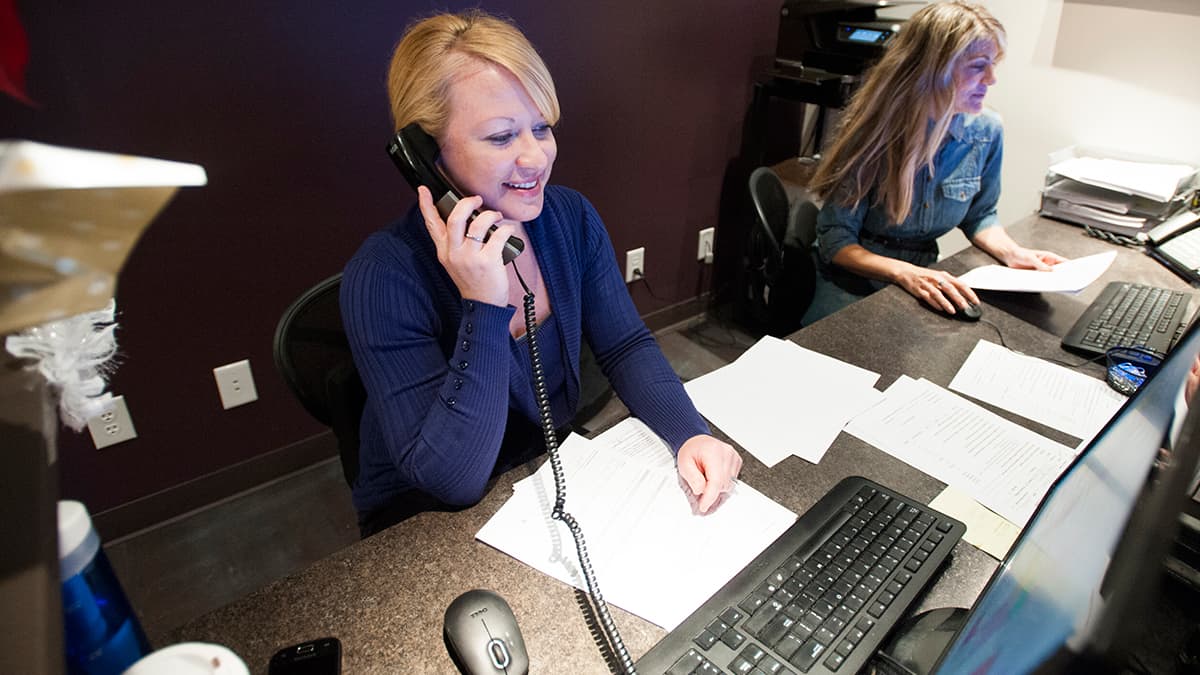How to Choose the Right CRM Software for Your Business
Learn how customer relationship management (CRM) can help your business grow, plus how to pick the right CRM software.

CRM stands for Customer Relationship Management, and it’s something you’ll have to think about in order to grow your business. CRM software allows you to save and manage information about your current and prospective customers so you can keep in touch and follow up with them.
CRM helps you service your existing customers with the goal of keeping and getting more business from them. CRM can also help you turn leads and prospects into new clients. Think of CRMs in terms of a combination rolodex, calendar, lead tracker, task manager, and sales analysis tool all rolled into one.
What Does CRM Software Do?
At its core, CRM is a database that helps you manage your contacts and communication. You (and/or your salespeople) enter information about your customers and prospects, and your CRM software will help you keep track of the details.
CRM software is available at different price points with different features, and many have modules you can add on as you need more functionality. We’ll explore some of those below.
Depending on your goals, you can use CRM to manage the sales pipeline, organize your marketing efforts, figure out how long it takes to close deals, automate your customer service, keep track of your customers’ interactions with your business, learn which products sell best and when, which marketing and promotional offers are most successful, and manage inventory based on historical sales data.
6 Reasons to Consider Using CRM Software
1. CRM software will help you get organized.
Once you set it up, all your information will live in one place. Gone are the little slips of paper and sticky notes to remind you to call so-and-so on such-and-such date. Having to check back on your calendar for the last day you spoke with someone is a thing of the past. If you’ve ever had to search through emails to find details of a proposal you made or deal you struck, CRM would save you that frustration.
2. CRM software keeps your client communication up-to-date. It can tell you at a glance which clients are ready for a callback, or who needs more information. It gives you instant access to an account’s status so you know what your next action should be. It updates whenever you send an email or make an appointment. When you input the results of each contact, you’ll never have to wonder how you left off.
3. CRM software integrates with your calendar. CRM software will inform and remind you of every task you need to do to follow up with a customer or lead. For individuals, this is a helpful tool to make sure things don’t slip through the cracks. For sales managers, it’s an important way to monitor what your team needs to be doing at any particular time.
4. You can access your CRM database from anywhere. Today, most CRM software is cloud-based, so you have access wherever you are, whether you’re on a desktop, laptop, or mobile phone. Storing information in the cloud also means it can’t get lost. Notepads and appointment books can go missing. Laptops with information stored locally can be stolen. Not so with your CRM data.
5. CRM software can help you make financial forecasts. When your customers’ information is entered, you’ll have the whole picture about their ordering habits and can plan accordingly, whether that means stocking up on inventory or beefing up your staff. There are no guarantees the pattern will continue, of course, but a good CRM can give you a pretty good idea of what to expect based on past performance.
6. Many CRM programs give a variety of useful reports. Sales projections are just one type of report available from most CRM programs. You can also find out how many leads you closed and which method of trying to reach people is most effective. Find out who your most (and least) profitable customers are, what the most common issues and objections clients and prospects have with your company, and products that have the most loyalty. Many CRM programs will also let you create custom reports specific to the needs of your business.
CRM Best Practices
As with most tools, CRM is only valuable if you use it. Here are some tips and suggestions:
1. Make Customer Relationship Management a habit. Start each day by checking in with your CRM system to see who needs to be contacted that day and what tasks and projects need to get done. This will help you keep hot leads hot and not have anyone wait too long for service, a quote, or anything else you promised to deliver.
2. Keep your CRM information up to date. The best way to use CRM is in real time as contacts are taking place. That means emailing through the software, logging phone calls and meetings immediately after they’ve taken place, and noting follow-up actions needed and taken.
3. Hire or appoint a CRM administrator. This might be you, a sales manager, or another employee who will get to know the ins and outs of the software, keep everything up to date, and hold everyone accountable. Some firms hire outside companies that specialize in CRM administration, in the same way they’d hire an outside bookkeeper or IT support. Listen to the feedback you get from the employees who are using it, and adjust accordingly to make it easier to use.
4. Customize your CRM for your business and industry. For the info you gather to be useful, it has to be meaningful to your specific situation. Modify the software so it contains data relevant to your company. Add or delete as many fields as necessary to generate the information most helpful to you. If you require your salespeople to enter a boatload of information, compliance is going to be low. Make it quick and easy to input data about a client, lead, or prospect.
5. Create standards for entering CRM data. CRM is most useful when everyone using it is providing the same type of information in the same format. This will make your reports easier to run and more meaningful. Hold a training session or two to make sure everyone is on the same page.
6. Make CRM fun to use. Salespeople are competitive, so offer rewards and recognition. Post a leaderboard or status updates to encourage CRM use. The more active and engaged everyone is, the more the system will be used, and the more valuable the information your CRM reports will provide.
6 Ways to Choose the Right CRM for Your Business
Here are tips to help you choose the best CRM solution:
1. Choose the CRM software that offers the right features for your business. Think about the kind of information that would be helpful to you, and make sure the product provides it. For example, some CRM systems are geared for business-to-business clients, and others, to business-to-consumer operations.
Think about how much you need the CRM to do now, how you might grow with it along the way, and how scalable it is through modules you can add. Find the balance between a system that does what you want it to but isn’t overkill and too difficult to use or master.
2. Make sure the CRM program can be customized for your business. Investigate how you make changes and adjustments along the way. What kind of help and support is available?
3. Ensure that the CRM system is cloud-based and mobile friendly. As we said above, CRM needs to be used to be effective. You and your staff will want to be able to use it on the fly, which these days, will likely mean on a phone or at least on a wifi-enabled laptop.
4. If it’s important to your business, make sure the CRM choice integrates with the other systems and software you already have in place. Most small businesses use CRM primarily as a contact manager and benefit from tying it into email. Integrating your accounting software can give you even more information and richer reports. Be sure the CRM you are considering works with the way you already work.
5. Match the CRM’s cost to your business’ financial needs. Make sure the CRM fits your budget as well as your needs. Generally speaking, the more features a system has, the more it will cost. Some applications are free, but they are usually stripped-down versions limited to a couple of users per company.
For a CRM program with more functionality, expect payments to begin from about $20 per user per month and go up from there. Insightly, for example, charges $29 monthly for basic features such as contacts, tasks, organization and opportunities.
At the high end, you could pay hundreds of dollars per month for advanced features from a fully loaded version of Salesforce with a custom dashboard, social media integration, automatic lead generation, and other advanced features. Salesforce also offers more basic capabilities for far more modest prices.
6. Take your CRM product for a test drive before purchase. Demo the product before you buy it. Understand how it works and what it can do for you. Be certain the software is something you and your staff will be comfortable with and actually use. A CRM system is only as useful as the information it’s given to work with.
If you want to learn more, check out Business News Daily for an overview of nine popular CRM products geared to small businesses. If you’d like still more info, Capterra and PC Mag also feature reviews and rankings.







